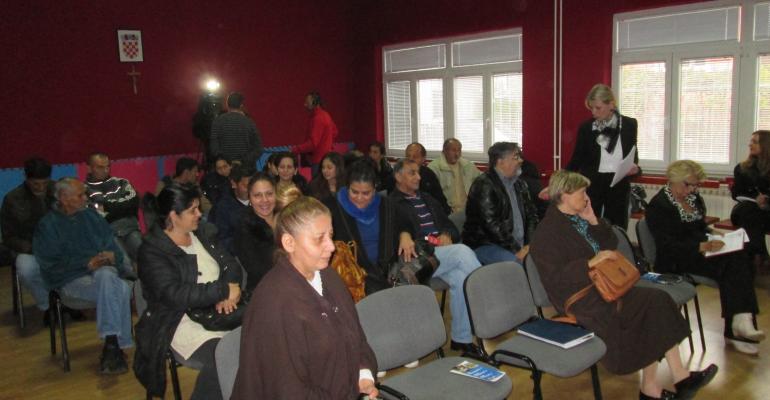Community meeting “Social rights and improved housing accommodation of Roma in Zagreb”
Published: 2014/22/11 13:21

JT Zagreb 22.10..JPG
Within the project “Free Legal Assistance to Roma in Civil Registration in Croatia” and in cooperation with the Council of Roma National Minority in Zagreb, ILC organised a community meeting in Zagreb entitled “Social rights and improved housing accommodation of Roma in Zagreb”.
This meeting was held on 22 October 2014, in the local community building in Kozari Bok.
Guests of the meeting were Jasminka Lukac, head of the City Office for legal and property relations and the city’s assets in Zagreb; Zeljko Zaninovic, head of City Office for relations with national minorities and religious communities in Zagreb; Mirko Markovic, adviser of the Government Office for Human Rights and Rights of National Minorities; Anita Grgos, adviser for social care in the City Office for social protection and people with disabilities in Zagreb; and Ivana Cikac, adviser for housing accommodation in the City Office Zagreb.
Mr. Nedjatin Kamberovski, president of the Council of Roma National Minority in Zagreb and Mrs. Talita Jasarevski, member of the Council of Roma National Minority in Zagreb, were moderators of this community meeting.
38 member of Roma national minority attended this event, as well as national media.
Mrs. Jasminka Lukac- stressed that the main criteria for allocation of city apartments are applicant’s social status and health condition. She pointed out that the City of Zagreb does not own enough apartments for providing housing to all persons in need.
In case of Roma housing, she pointed out that, according to their past experience, Roma families have difficulties adapting to living in apartments, which leads to disagreements with their non-Roma neighbours. Therefore, the City of Zagreb is undecided whether the allocation of city apartments is the best solution for Roma housing or the other possibility, which is to build new Roma settlements. Finally, Mrs. Lukac emphasized that all those concerned with housing accommodation should contact the City and together, they will try to provide suitable solution for their needs.
Mrs. Anita Grgos - pointed out that the Social Welfare Centres in Zagreb County have not yet completed the revision of minimum financial assistance for their beneficiaries and that therefore the allocation of social welfare to their beneficiaries is somewhat slower.
She presented one example of financial aid the city of Zagreb can assign to their beneficiaries: if the amount of minimum financial assistance for one beneficiary is 800 HRK, then the City can assign a subsidy in the amount of 400 HRK for utilities expenses.
The problem represents the fact that more household members are living together in the same household and at the same address, so they cannot obtain a subsidy for utilities expenses individually because they receive a guaranteed minimum assistance on a joint account.
In the end, she invited all present at the meeting and in need for housing accommodation to address the City Office Zagreb for help.
Mr. Zaninovic – emphasized a good cooperation between the City of Zagreb and the Council of the Roma National Minority, and he expressed his hope that this good cooperation will be continued in the future in order to resolve as many as possible issues concerning Roma population in Zagreb.
Mr.Markovic – informed all the present that the Commission for implementation of National Roma Inclusion Strategy 2013-2020 brought a new decision regarding obtaining financial assistance for Roma and that from now onwards the competent authorities to address for one-time financial assistance are Centres for social welfare
The Commission will continue to deal with the issues that are of wider community interest, and will finance the requirements relating to the costs of registration and scholarships for adult Roma, the costs of textbooks and transportation of children in kindergartens or schools. In order to use this provision, members of Roma national minority are invited to address NGOs, institutions and local governments who are entitled to sent the official requests to the Commission, on behalf Roma in need.
During this community meeting that lasted for 2 hour, citizens were active, asking questions and seeking advice from guests.
Most frequent comments and questions that were asked during community meeting referred to the low amount of minimum financial assistance, which brought many Roma families in more difficult financial situation because they do not have sufficient funds to pay utility expenses and to feed their families.
Besides, numerous comments were made regarding the decision of the Centre for Social Welfare to suspend the right to a minimum financial assistance for people who own cars, which jeopardized their existence.
Regarding Roma housing, most participants agreed that the best solution for their community would be building of a new settlement, rather than allocation of apartments in residential buildings.
Few of those present who applied for the allocation of apartments stressed that although they are on the waiting lists for housing, the procedures are time-consuming.
The guests of the community meeting tried to help present citizens with their advices on how they can best exercise their rights.
They also invited all those who have problems related to social issues or housing to contact them.
This community meeting lasted for two hours, and the conclusion of all those present was that such meetings should be organized more frequently so that citizens can directly obtain useful information.
